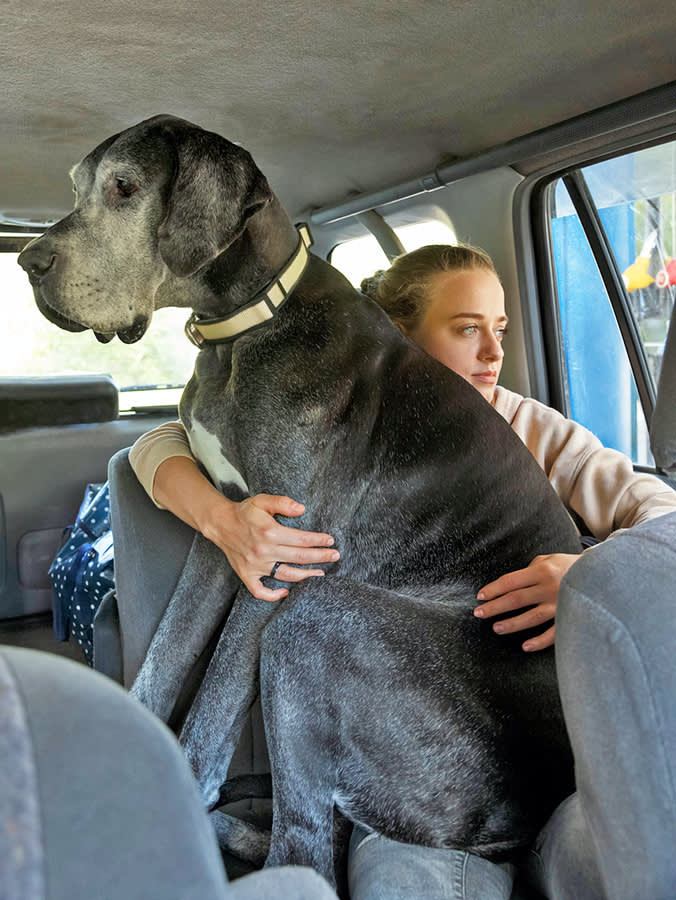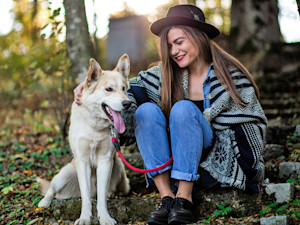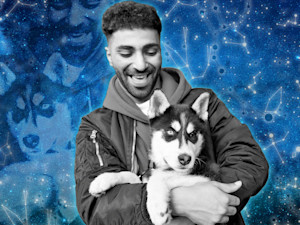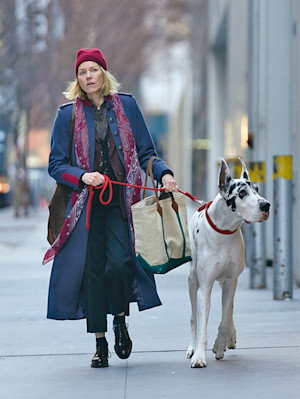Why Do Great Danes Not Realize How Big They Are?
They just really want to sit on your lap.

Share Article
We’ve come to respect a certain level of personal space in society, but not every creature would agree. Take the Great Dane, that jolly giant of a dog who would like to stick their large butt on your lapopens in new tab — do you have some sort of problem with that?
It would seem like a creature who’s sometimes bigger than their pet parentopens in new tab would have some sense of how giant they are and politely dial it back, but the lovely, genuine Great Dane is a bit clueless about their imposing stature. (You would be forgiven if you mistook this rumpopens in new tab for that of a Holstein cow.)
“They don’t seem to have a sense of their size,” says veterinarian Dr. Justyna Meenanopens in new tab, medical director at VCA Burrstone Animal Hospital in New Hartford, New York. “This becomes especially evident in crowds where your Dane is attempting to say hello to everyone and is stepping on people's toes left and right.”
It’s also evident in TikToks like the one below, where this very sporty Great Dane clearly believes he’s in some sort of vaulting competition, and the target is dad’s stomach.

So, why don’t Great Danes know how big they are?
“They truly do not seem to realize they are so much bigger than everything around them,” says Dr. Jennifer Johnsonopens in new tab, medical director at VCA Health Associates Animal Hospital in San Antonio, who has a Great Dane named Maverick. “They don’t grasp the idea of personal space and often truly believe they are a lap dog.”
What’s more, Dr. Johnson notes, is that “they’re also typically very affectionate and crave their human’s touch and affection, making them even more likely to crowd you.”
That might explain why Great Danes try to climb into your lap, but not why they don’t know their own size. And the truth is that science just hasn’t gotten that far yet. In fact, most canines probably don’t have a sense of their body size.
It’s not that researchers haven’t tried: A 2019 studyopens in new tab found that dogs approached too small openings with a slower latency and did not try to go through them. “We concluded that our results convincingly assume that dogs can represent their own body size in novel contexts,” the study authors wrote.
However, as animal behaviorist Karen B. London told Kinship in 2021, the study also doesn’t disprove other explanationsopens in new tab for their behavior. “Perhaps what this experiment shows is that they are capable of determining what they won’t fit through, which might simply mean they can see that objects and gaps are different sizes,” London noted.
And all the experts we spoke to about Great Danes say that dogs, no matter their breed, are probably not aware of their stature. “Dogs do not appear to have a conscious understanding of their size, but will adjust to their surroundings and environment through trial and error,” Dr. Johnson says.
Dr. Liz Stelowopens in new tab, a veterinary behaviorist at the UC Davis School of Veterinary Medicine, says a lot of the debate surrounding whether dogs can recognize their size is conjecture, because the question can’t be definitively answered by research.
“It’s not clear that dogs actually have any sense of their actual size, other than their ability to access certain things: tall enough to reach food on the kitchen counters, small enough to get through a hole in the fence, tall enough to jump on the bed,” Dr. Stelow says. “And many dogs can be like bulls in a china shop when they try to push their bodies through areas they don’t fit.”
There are some possible reasons for their behavior though
Adorably, the act of planting their backside on your lap could be a self-soothing behavior — and have nothing to do with their size but only about wanting comfort, Dr. Meenan says.
“In my experience, Danes tend to be quite timid. So, protecting their backends by sitting on their owners’ laps is a soothing behavior,” she explains. “But when they're looking for some pets and cuddles, they definitely take advantage of Dane-sized furniture, such as chairs and couches to plunk down next to their favorite person, often sitting with their back legs on the sofa, and their front legs still on the floor.”
Dr. Johnson says that Great Danes have been bred for companionship for more than a hundred years. “This means they have become the best friends of their humans, and despite their typically shorter lifespan, leave the biggest nose print on their owners’ hearts,” she says.
While you might not think of your Great Dane as a big baby, these canine kiddos can be prone to missing you a little too much when you’re gone (and want to snuggle when you’re back). “Great Danes were originally bred as hunting dogs, making them very people-oriented, as hunting breeds typically are,” Dr. Stelow says. “As such, they are typically very affectionate and, unfortunately, can be susceptible to separation anxiety.”
How to get a 150-pound dog off your lap
Speaking of separation anxiety, it’s OK to admit that even though you adore your pup with all your heart, you sometimes need someone who weighs as much as a king-size mattress off your lap. If things get to be a bit too muchopens in new tab, it’s totally OK to redirect their behavior, Dr. Stelow says.
“As with all dogs, if you don’t like what they’re doing, you can gently ask for a different rewarding behavior,” she explains. “For instance, you may offer to give a food toy for him to be on his own bed. Or you might suggest that you play together with a tug toy instead.”
She stresses that positive reinforcement is key here: After all, your pup’s just trying to show you affection (and get affection) the best way they know how. “There’s never any need to scold, push, or utter the words ‘get off’ unless they’re followed by ‘you silly dog’ and uttered in the most affectionate possible voice — and accompanied by an offer of something else the dog might like to do instead,” Dr. Stelow says.
Dr. Meenan agrees: “Gently sliding them off to the side so they plunk down next to you or between your legs and giving them some good pets is just as rewarding.”
But kindly remember that dogs get separation anxiety because they struggle without you. So, be supportive and offer resources to help them thrive. After all, Great Danes are hopelessly loyal and loving. “They truly are giant teddy bears,” Dr. Johnson says.

Marti Trgovich
Marti Trgovich is a writer specializing in pets and wildlife. She has written about animals for National Geographic, The Washington Post, Newsweek, and other publications, and she spent nearly a decade as an editor at The Dodo. Her favorite animals are guinea pigs, sheep, and small, saucy senior dogs.
Related articles
![Woman petting her pet wolf dog outside.]()
Wolfdogs vs. Domestic Dogs
What you need to know about the differences between the two.
![A person with a dog in front of a starry backdrop]()
What Dog Breed Are You Based on Your Zodiac Sign?
Find out if you’re more of a Chihuahua or maybe a Golden Retriever.
![World's tallest and shortest dogs meet.]()
Watch the Tallest Dog in the World Meet the Smallest Dog in the World
It doesn’t get cuter than this.
![Naomi Watts and a large dog in a still from The Friend]()
Meet Bing, the Charismatic Great Dane and Star of the New Movie, “The Friend”
We spoke with the pup’s trainers about what it was like to work with Naomi Watts on the big screen.
What are Low-Maintenance Dog Breeds for First-Time Pet Parents?
Any of these breeds are a great option for adoption.






